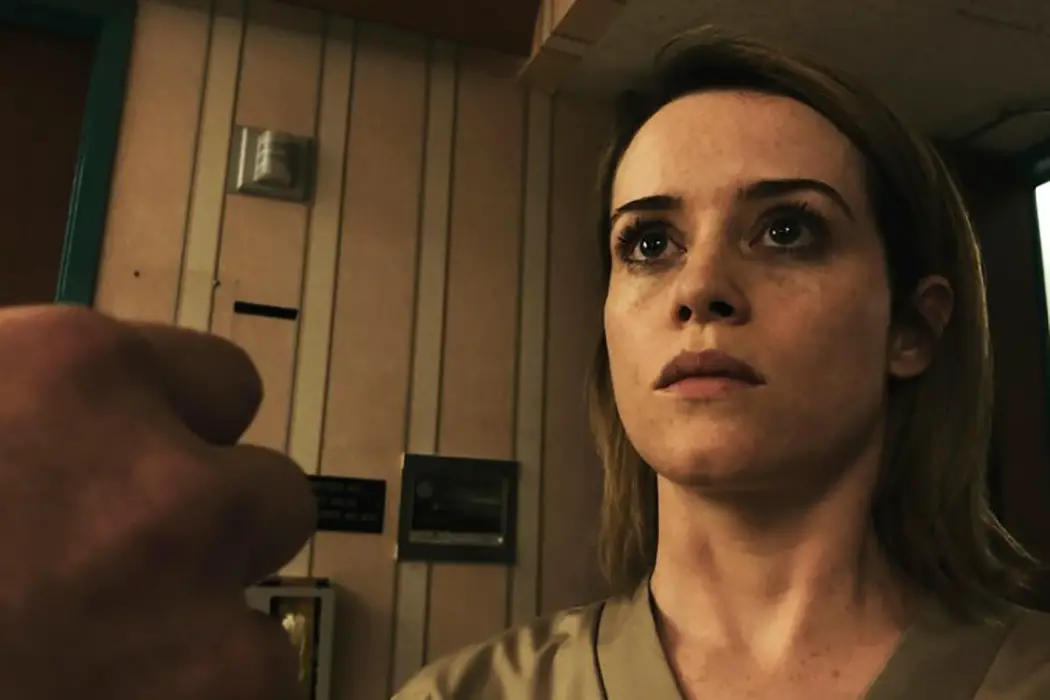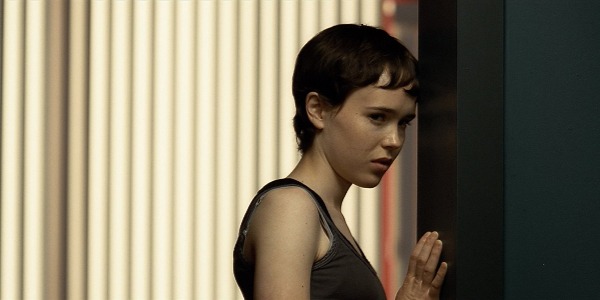UNSANE & The Questioning Of Exploitation Cinema

Alex is a film addict, TV aficionado, and book lover.…
If you’re like me, then the sickening experience of watching a movie you find repulsive is hard to shake. It’s as if the film covered you in a slime that, despite never wanting to get the stuff on you in the first place, refuses to wash off. Unfortunately, this is precisely what happened when I saw Unsane, the latest from director Steven Soderbergh.
The story of a stalking victim being held against her will in a mental health facility struck me as nothing but exploitation, an attempt to get big thrills out of a truly horrific scenario. Rapidly compounding abuses, dingy visuals (Soderbergh famously shot the film on an iPhone), and an early, gratuitous down the shirt shot quickly made me realize what I was in for, and Soderbergh only embraces his sleazy influences more and more as the film goes on. I walked away thinking the movie was vile. Not misguided or unbalanced, but vile from beginning to end.
How then, I wondered, was the film receiving such strong reviews? Other critics repeatedly pointed out its B-movie status, but this was widely used to dismiss the elements I found so upsetting. That it aimed to deliver thrills and was successful in doing so was enough, it seems, to recommend it, and that it came from a respected director pulling from exploitation cinema’s history (many point out Shock Corridor and giallo as potential influences) gave it a virtual pass in terms of content.
But should content be excused because it’s plying in accepted tropes? The question gnawed at me, and batting it back and forth opened up all sorts of contradictions about my enjoyment and revulsion of exploitation cinema. Because hey, I like titillation as much as the next person, and I certainly find some of these films to be worthwhile. So what was it specifically about Unsane that pushed it over the line for me, and is it even helpful to discuss such a personal line when critiquing a film?
The Nastiness of Unsane
Exploitation films can be a pretty broad category, encompassing anything that uses sex or violence as the primary means of entertainment. Often they have a low budget and often they impart little meaning along with their thrills. Unsane fits squarely in that category, because while its production budget is unknown and some have applied a #MeToo lens to the plot, the latter is laughably undone by its climax and the former is irrelevant because of Soderbergh’s chosen style.

I’ve already mentioned that Soderbergh shot the film on an iPhone, and given the aesthetic he’s going for, it wasn’t a terrible choice. The film repeatedly uses camera angles that mimic either the stalker’s point of view or a security camera, giving the proceedings a voyeuristic feel. Whatever the budget was, Soderbergh spent that money achieving a do-it-yourself vibe, and the suggestion that the audience is seeing private moments does enhance the thrills.
The problem is that this approach plays right into the problems with applying any sort of #MeToo lens, because while many characters do make the situation worse by not listening to our beleaguered protagonist (who’s totally real and not a porn name is Sawyer Valentini), the film also leads the audience to question Sawyer’s claims themselves.
Even before the first gratuitous bra shot, the audience is fed a moment of uncertainty when Sawyer gets unusually alarmed by a man walking through her office. This is quickly set aside, but after the film clues the audience in to Sawyer’s often manipulative and erratic ways, it also hangs the question of whether her stalker, who she claims has become a staff member at the facility where she is being held, is really there or if she’s suffering a nervous breakdown. Thankfully, the film dispels with the latter idea fairly quickly, but that it prompts the audience to ask at all makes us complicit in the harmful disbelief.
And does the film turn the tables on us to make us feel guilty about our doubt? Of course not; it keeps us removed through our voyeuristic perspective and even amps up a ‘thrilling’ sexuality as the stalker’s aggression escalates. The audience knows Sawyer is in real danger now, but instead of letting the horror of the situation stand, Soderbergh leans on cheap tropes to make it even more titillating. The threat of rape and a completely unnecessary girl-on-girl kiss marks the climax of the film (the lesbian is also immediately killed, so thanks for playing into that annoying cliché), and the fact that Sawyer still has untreated trauma after all is said and done is used as a ‘fun’ end stinger.

Like many exploitation films, the excitement in Unsane comes from watching the characters suffer, and that makes it a clear-cut case of exploitation. Other films are harder to categorize, though, because they might have slicker production values or have a solid plot backing them up. That’s why you have to dig a little deeper when films lean on sex or violence to ask whether we should be applauding them for delivering their chosen thrills.
Can We Agree On The Ethics Of Titillation?
Before going any further, I want to make it clear that there’s nothing wrong with getting enjoyment from exploitation. We’re nothing but mammals, after all, and we can derive pleasure for all sorts of complex reasons. Violence and sex causes our bodies to react, and the combination of desensitization and removal from actual harm means we get the highs without the downsides when watching this content. This gets to the core of why cinema works at all, and I see no reason to disparage films that use cinema’s power for pure entertainment.
What that doesn’t mean is that we should have to set aside our morals and ethics to enjoy them. At least, that’s how I feel, but I’m sure some would push against that. Scott Tobias danced around the idea of embracing films for their sensation alone in the article Can An Exploitation Movie Be A Great Movie?, but even he was framing the argument around our most respected exploitation jockey, Quentin Tarantino. But if the argument stands for Tarantino then it should stand for all, and given the widespread whiff when it came to critics evaluating Unsane beyond the execution of its thrills, it certainly seems to stand for Soderbergh.
I suppose this borders on a philosophical point, but I infer that such arguments promote putting aside any moral or ethical concerns when viewing a film, which I think is both impossible and dangerous. In life we do not mindlessly follow sensation because doing so would leave us in a far harsher world than we currently have. Most of us, to some extent, try to tame our own savageness, and we have benefited from reducing nihilistic behavior like killing others because it’s hot and the sun is in our eyes. I understand that film is not the real world, but why should I be expected to condone or even rejoice the effective simulation of something I find repugnant?
So if we jump past the first hurdle of accepting that you can apply some sort of moral evaluation to exploitation, how then do we even start establishing rules? Morality isn’t set, after all, and the line separating offensive from non-offensive material will be different for everyone.
I can draw my own line, which mostly comes down to an exploitation film doing one of two things to justify itself: making a point that’s worth all the nastiness or winking at the audience to let them know that none of this should be taken seriously. Suspiria wants to bathe its murders in colorful strangeness? Great, go for it. Hard Candy wants to rub our face in the awfulness of revenge plots? Please do.

The latter actually brings up a sticking point in my own line, one that would cause many people to dismiss it as too stringent. I hate revenge plots, despise them, want our whole fascination with them to be thrown out and burned in a magnificent garbage fire. To me, they reflect our self-absorption and our comfort with impulsively causing wanton pain, and I think the bar for justifying these films should be very high. Given how pervasive they are, though, it seems most people disagree.
So I’ve taken to not arguing the point, dismissing John Wick and the myriad of action films that use revenge as a quick justification for marauding violence as ‘not my type of movie’. It’s acquiescence, yes, but it also comes from understanding that my morality line is not everyone’s line, and I’ve always been uncertain about how to handle that when I’m clearly in the minority.
Is Any Of This Helpful Criticism?
It’s a tricky question to address, because in the end it runs into the ill-defined wall any conversation like this eventually hits: who’s to say how cinema should be used? One can argue points based on well-researched historical use and film’s influence on the wider world, but there is no god of cinema setting rules for everyone to follow.
So I can share my reading, you can share yours, and all we can hope for is that we learn something from each other. In the end all we’re doing is batting around ideas, after all, and as long as everyone is making reasoned arguments, then the discourse becomes its own lesson.
Of course, that means you have to point out the missteps you see, whether it be in exploitation or any other genre. Your personal moral line may be the framework of your argument, but it has to be supported and it has to be open to refinement. Everyone’s perspective of the world has blind spots, and that’s why it’s important to have diverse voices in criticism and why it’s important that we listen to each other. If we don’t poke at tropes and the status quo then nothing changes, and homogeneity is the death of both art and criticism.
So I guess get ready for me to start badgering all those revenge flicks.
What are your thoughts on exploitation cinema?
Does content like this matter to you?
Become a Member and support film journalism. Unlock access to all of Film Inquiry`s great articles. Join a community of like-minded readers who are passionate about cinema - get access to our private members Network, give back to independent filmmakers, and more.
Alex is a film addict, TV aficionado, and book lover. He's perfecting his cat dad energy.













